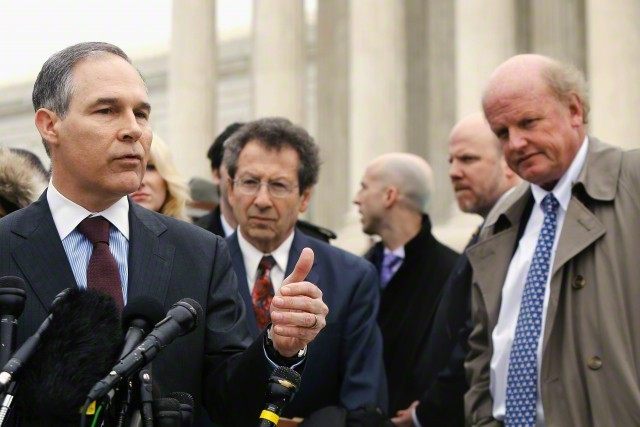Editor’s Note: This Op-ed was authored by and submitted to Breitbart Texas by Oklahoma Attorney General Scott Pruitt.
After hearing oral arguments in King v Burwell, the Supreme Court is now considering its ruling in a case that presents what is likely the costliest example of executive lawmaking in the history of this Nation.
Here’s what you need to know about the case: the Affordable Care Act (ACA) authorizes tax credits to be used to supplement the purchase of ACA-compliant health insurance through the ACA’s health insurance exchanges. But the ACA specifies that that the credits are only available through state-established exchanges, and not through the federal exchange (www.healthcare.gov). Importantly, the ACA also says that tax penalties on large employers for not providing ACA-compliant health insurance are triggered by an employee’s purchase of subsidized insurance on one of the state-established exchanges. In other words, the tax credits can’t be handed out, and the large-employer penalties cannot be assessed, in states that have declined to establish ACA exchanges.
Because 37 states, including Oklahoma, declined to establish exchanges, this meant that these key ACA provisions would not go into effect in the majority of states. This was a huge problem for implementation of the President’s pet law, so his administration issued an IRS regulation that flatly rewrote the law, so that the credits were available for insurance purchased on all exchanges, including www.healthcare.gov.
The result of this executive rewriting of the law is that almost a billion dollars in tax credits were authorized in contradiction to Congress’s intent, and billions more in penalties on employers will soon be assessed, also in flat contradiction to the will of Congress.
It’s one thing when the President says that gridlock in Congress “forces” him to use his pen and his phone to circumvent Congress, but it’s quite another when Congress passes precisely the law the President wanted, yet he still can’t resist the urge to rewrite the law whenever he feels it necessary, and that is precisely what he did here.
I am encouraged to see the federal courts increasingly stepping in to rein in this sort of executive overreach. A federal judge recently halted the president’s executive actions on immigration in 26 states – including Oklahoma – that have challenged his unconstitutional executive actions. Likewise, a federal court in Oklahoma has ruled that the IRS rule at issue in King v. Burwell is unlawful. In other words, I am hopeful that the Supreme Court will agree that the IRS rule is unlawful, and will put a stop to this extraordinary example of unauthorized spending and tax penalties.
If the court does that, it will present Congress with an extraordinary opportunity to accomplish the real, meaningful health care reform that supporters of the ACA promised but never delivered. If the ACA must be implemented as written, then the large-employer penalty will be effectively unenforceable in the 37 states that didn’t establish state exchanges. The individual mandate also would likely be unworkable in the 37 states thanks to the ACA’s exemption for those individuals whose cost of health care exceeds 8 percent of their annual income; the subsidies were intended to prevent these exemptions from ever being triggered. Additionally, without the tax credits to subsidize the costly ACA-compliant health insurance, the average American will begin to feel the real effects of the President’s disastrous attempt at making healthcare more “affordable.”
When this happens, the ACA will begin to slowly implode and Congress will have the opportunity to step in to pursue a variety of free-market, competition-based policies. The states too will be able to address the issue of extending health care to the uninsured as they did prior to the passage of the ACA.
Right now, the administration is fighting a desperate PR battle to try to justify its unlawful actions, trying to shift the focus on the effect that loss of the subsidies will have on the citizens who are currently receiving them in violation of the law. But what cannot be ignored is that this is a problem of the administration’s own making, and one they could have fixed in 2012, in the halls of Congress. They instead made a political calculation not to pursue a legislative fix, out of fear of concessions they would have to make to get that fix. So any “ill” effects of this conscious choice to govern by executive fiat are effects that can be laid squarely at the feet of the president and his political advisors.
Respect for the rule of law sets our democracy apart from all others. The IRS rule and the president’s immigration executive actions are an affront to the rule of law. Words, especially those in federal laws like the Affordable Care Act, have meaning and the Court should heed the words of the ACA and side with those of us who brought this legal challenge to bear.

COMMENTS
Please let us know if you're having issues with commenting.